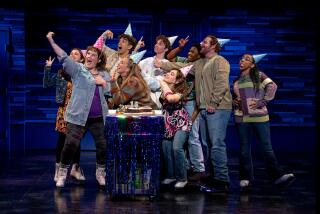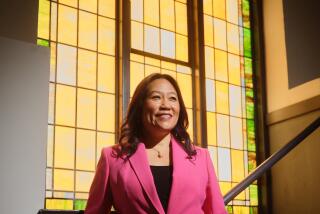Amy Hill and Her Looking Glass : Theater: ‘Beside Myself’ is the performer’s third autobiographical show that explores coming to grips with a multiethnic background.
“It would be great if people could guess right off that I am Japanese-Finnish-American. But then I’d have to be wearing a kimono and pulling a reindeer,” Amy Hill says during her new one-woman show, “Beside Myself.”
Hill darts around the small stage of the East West Players, pulling out portraits of her family, slipping into her mother’s thick Japanese accent, or imitating the “yah, yah, yah” of her father’s friends.
“I was mortified by my parents--what they did, who they were, everything. I hated who I was. I hated everything, and I would live in a fantasy world and try to be different,” she says at her Silverlake apartment before the show. “But that’s not a lot different, I think, than a lot of kids.”
“Beside Myself” is Hill’s third autobiographical piece. Gauging by the success of her first play, “Tokyo Bound,” her stories have an honest core that audiences respond to.
“When I wrote ‘Tokyo Bound,’ that was just something that I had to get out of me. I knew there was something really important that happened to me in Japan, I just didn’t know what it was. And then people just kept asking for more,” she says, her eyes wide with surprise.
Hill expresses more with her big eyes (she calls them “bulging” in the play) than most people do with their whole faces. But it’s everything--her voice, her posture, her tap dancing--that expresses the difficulties of growing up poor and multiethnic in Deadwood, S.D., and Seattle.
“As I wrote about my childhood, I realized that there was no big tragedy,” says Hill, now 40. “Being multiethnic is not a tragedy. I didn’t have any big life-threatening illnesses, no tumors, no kidney malfunctions. . . . I came from a very poor family. I was chubby as a kid. I felt outside everything.”
At 18, Hill went to Japan for five years--the period explored in “Tokyo Bound.” Then she moved to San Francisco, where she got her start in theater, writing and improv comedy.
*
Director Anne Etue hooked up with Hill after she settled in Los Angeles and has collaborated with her on all three autobiographical ventures.
“It’s a wonderful experience, from when we started out sitting in her kitchen, her saying, ‘Let me tell you this story . . . do you think we could do anything with that?’ ” Etue says. “I think that she really wonders . . . who cares? And it’s my job to say this works because there’s something that does reach out and have some impact.”
Hill is reaching out in all directions. She has a small part in Philip Kaufman’s upcoming film “Rising Sun.” She’s directing “29 1/2 Dreams” at the East West Players in September. She’s writing a new play and a PBS children’s show, “The Puzzle Factory.” And she hosts a monthly Asian-American teen-age talk show on KSCI-TV Channel 18 called “Get Real.”
It’s important, she says, to increase the visibility of Asian-Americans in the media.
“(TV) plays such a large part in defining what your world is, and your part in the world. It’s almost unforgivable that there isn’t any kind of responsibility to reflect that,” Hill says.
“When I was doing ‘Tokyo Bound,’ there was quite a bit of interest in trying to get an Asian sitcom on. . . . And then I’d go in and tell them my ideas, or write a script idea, and they’d say, ‘No this doesn’t work on television.’. . .
“They’ve been trying to put Asian-Americans in the generic white American sitcom mold, and it doesn’t work. And then they say it doesn’t work because it’s Asian.”
More to Read
The biggest entertainment stories
Get our big stories about Hollywood, film, television, music, arts, culture and more right in your inbox as soon as they publish.
You may occasionally receive promotional content from the Los Angeles Times.










